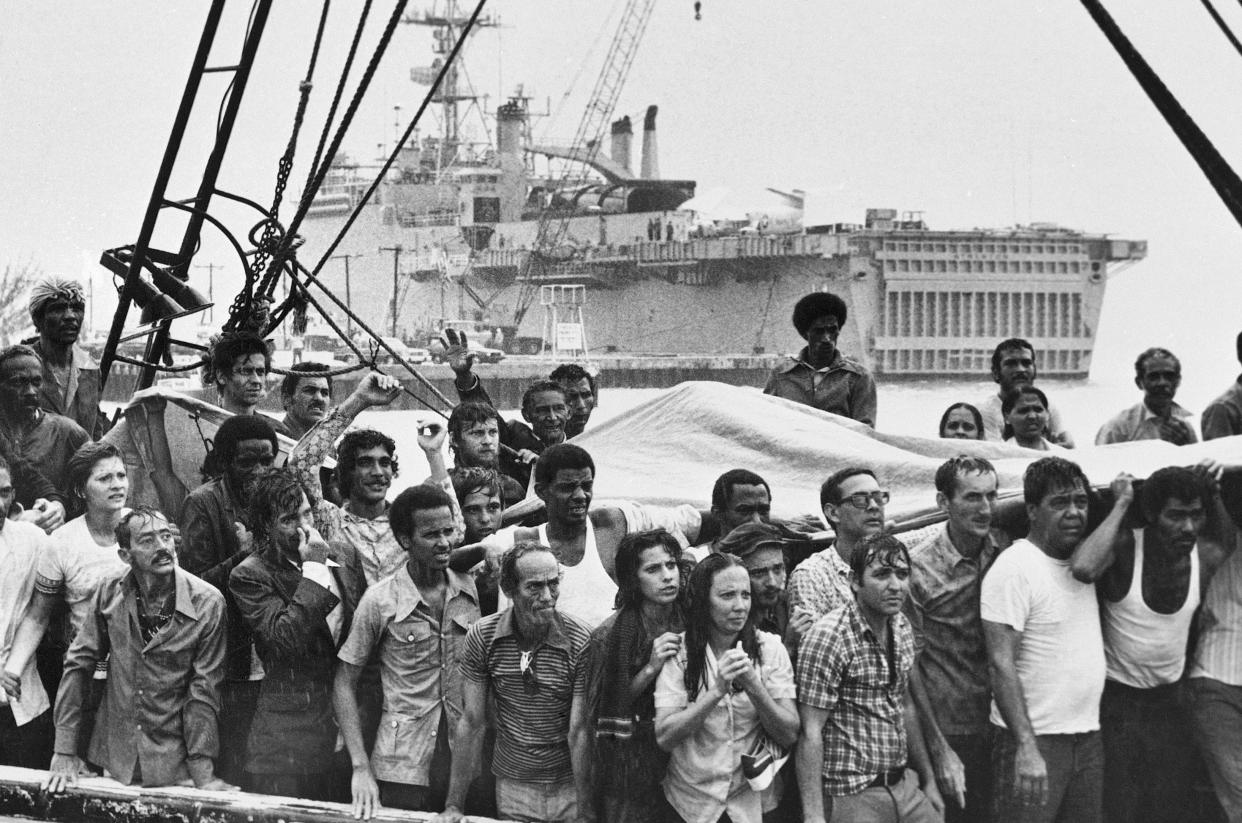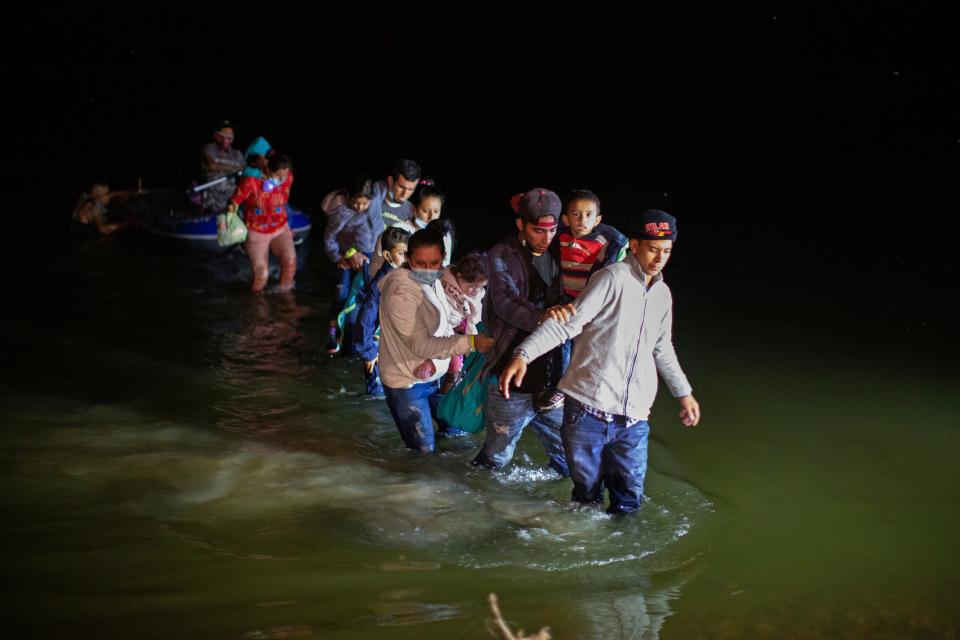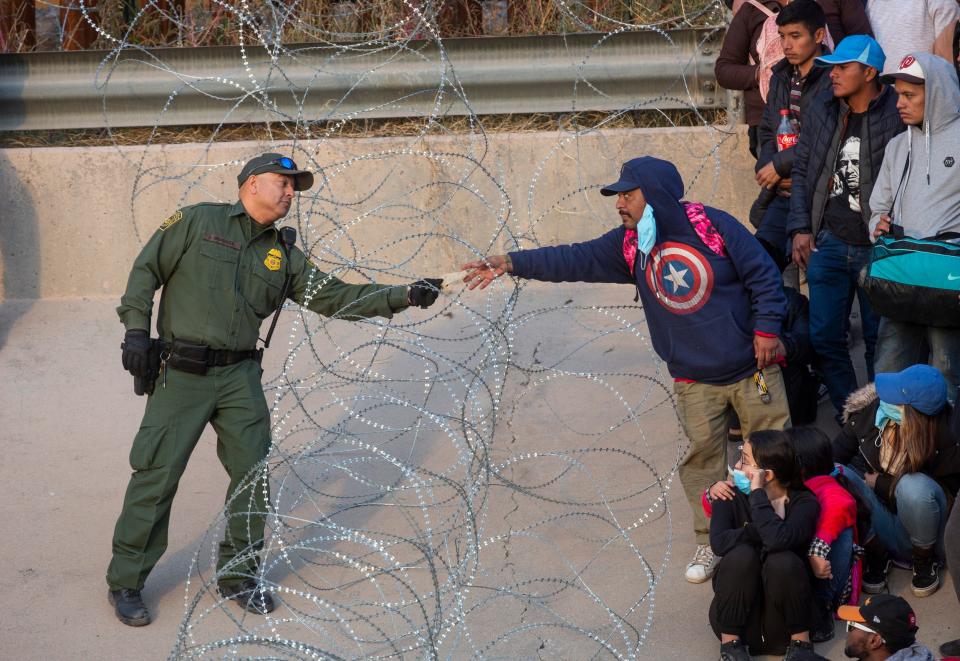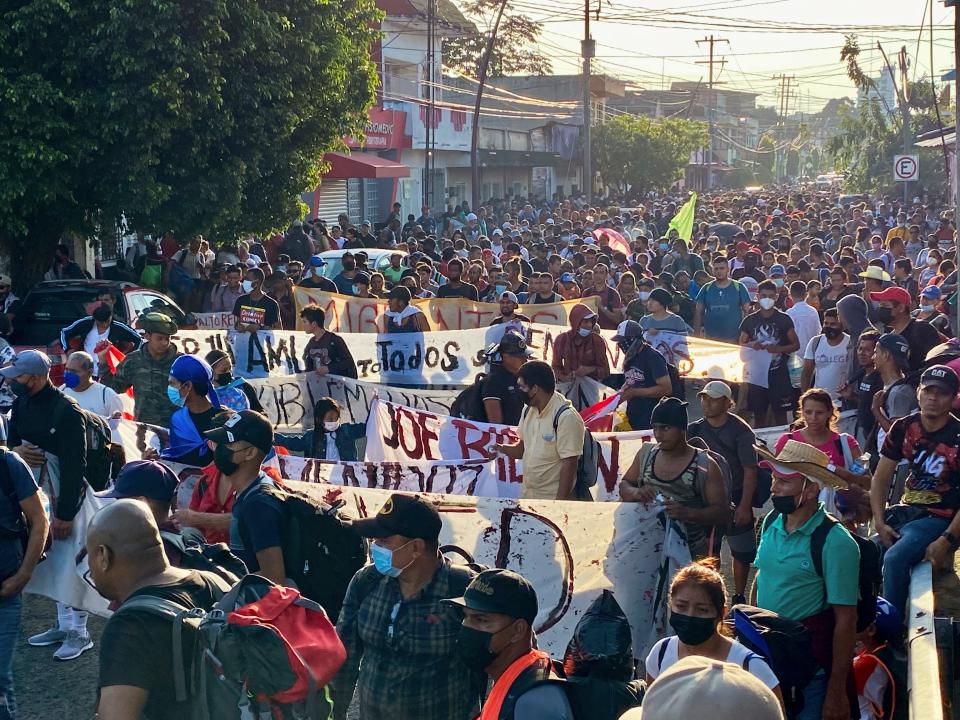Miami Republicans' plea for help from Biden official wades into partisan immigration chasm

- Oops!Something went wrong.Please try again later.
Even as their party seeks his resignation, three Miami congressional Republicans last month asked for an assist from Homeland Security Secretary Alejandro Mayorkas amid a surge in Cubans heading to Florida.
U.S. Reps. Mario Diaz-Balart, Carlos Gimenez and Maria Elvira Salazar, all Cuban-Americans, asked Mayorkas to add Cubans stopped at sea to a federal government-run online database listing would-be refugees and immigrants. Their Dec. 2 letter predated the national headlining of the Cuban migration surge when a group of 300 landed at Dry Tortugas National Park on New Year's Day, temporarily shutting down the remote attraction in the middle of the holiday weekend.
The trio's request, aimed to help the loved ones of those fleeing a desperate situation, was not highly unusual in itself. But it speaks to an awkward reality: Even an issue that is as polarized as migration to the United States sometimes leads to pleas for help from a political rival while placing you at a crossroad with your own partisan tribe.
Prior Cuba coverage:Social media, independent press at core of Cuba uprising. A lesson for US policy?
Immigration:Worker shortage crisis belies DeSantis' defense of 'trafficking' migrants to Martha's Vineyard
The three South Florida GOP lawmakers said in their letter that inclusion in the database would provide "timely, accurate information on whether they have been interdicted, their location, and other basic facts of their case" to loved ones and lawyers in the United States.
But the letter also included a political zinger of sorts at the Biden administration and its chief immigration point man, Mayorkas, himself a Cuban-American who came to America with his family in flight from the country's communist government.
"The administration’s apparent agreement with the Cuban regime to ramp up deportations of Cuban nationals seeking freedom has many unfortunate repercussions," the letter said. It added that an "unfortunate consequence of the administration’s increase in repatriations has been a corresponding increase in family members seeking information regarding their loved ones interdicted at sea."

As of Jan. 11, Mayorkas had not responded to the letter, Diaz-Balart's office said. But the Homeland Security chief said Sunday said he would not quit even as House Speaker Kevin McCarthy has vowed to "investigate every order, every action and every failure." On Jan. 3, a Texas GOP congressman filed impeachment articles against Mayorkas.
The greater irony, of course, is that the three GOP congressional representatives are members of a party that, amid a surge of more than 2.4 million people bidding to "illegally" enter America over the past year, has been skeptical if not dispassionate toward the plight of those very people. Last week, in fact, in the deadlock over the House speaker election, Republicans framed the crisis at the southern border mainly as open ground for deadly fentanyl and human trafficking while largely omitting the predicaments or conditions that drove people there in desperation.
Arguably the architect of an "America First" view of U.S. immigration, former President Donald Trump, issued a statement Jan. 10 taking credit for putting the matter on the nation's political forefront. The statement, as have the vast of Trump's positions, stressed security implications while passing over the humanitarian and economic aspects.
Help needed: Immigration crackdown worsens worker shortage for Florida businesses
Labor shortgages:Palm Beach County set to close 2022 with near record low unemployment
"When I was running in 2016, I was the only one talking about it, and then in 2020, there was nothing to talk about, because the Border was the best it has ever been, drugs were at the lowest point in the last 40 years, our Border was secure with hundreds of miles of Wall built, and Mexican Soldiers were guarding our Border for free," Trump wrote.
That, said one immigration advocate, is the biggest obstacle to comprehensive immigration reform.
Namely, rhetoric aimed at playing up border fears and "chaos," rather than building bipartisan support for an overhaul that achieves border security, meets the letter of law in providing refuge to those who qualify in an orderly process and addresses the country's labor needs.
"We really need to step back a little bit and really understand the context of the moment we are in," said Vanessa Cárdenas, executive director of the advocacy group America's Voice. "We need to reimagine our immigration system within the new reality that we have."
Immigration overhaul needed to address new global realities
Cárdenas said limited "Band-Aid" measures that attempt to momentarily ameliorate a specific problem, or give the veneer of a solution, are insufficient and no substitute for the larger immigration repair that is necessary.
The United States has "the resources and tools to manage migration" in an orderly and effective way, she said. Cross-border movement of people is a global issue, she added, noting that Colombia has managed to process 2 million Venezuelans and Poland handled 5 million Ukrainians.
Right now, the U.S. government has plenty of experience, rules and policies to address the largest groups seeking seeking entry into the United States — including Nicaraguans, Venezuelans, Cubans and Haitians — and labor needs to match.

"This whole notion that we somehow are unable to manage what is happening right now is not honest or real," said Cárdenas. "Now, does this mean the United States has to accept everybody? No. The fact is we have rules, we have laws, but I think we can create a migration system that is consistent with our economic needs … while at the same uplifting our laws, protecting our laws, and just following our laws in a way that does not violate our values."
What is missing, she said, is political will.
Cárdenas said Republicans see political gain by talking up the "chaos" and flow of drugs through the border, even though she said federal law enforcement data says the vast majority of illegal narcotics enter through U.S. ports. And Democrats too often wilt in the face of the rhetoric, she said.

"The GOP uses it as a political tool and Democrats are not able to deliver even if they promised to do so," she said.
Last week's border measures by the Biden administration are a mixed bag, Cárdenas said.
The Biden administration, acceding to intense pressure on the southern border, enacted "new enforcement measures to increase security at the border and reduce the number of individuals crossing unlawfully between ports of entry." The measures included a "pathway" forcing many more people to apply for entry into the United States from their home or third countries, plus more resources for anti-smuggling enforcement.
It's progress to set up "pathways" for people to enter the United States via an orderly application process that sets up sponsors and support networks in America, she said. But Cárdenas added that someone who has been threatened and is in danger doesn't have the "luxury of waiting for an appointment or downloading an app" and other steps in that process.
"On one hand they open a window, but they are slamming the door on somebody who could have a credible asylum claim," she said.
Inside Florida Politics:Sign up for our free weekly newsletter
Moreover, America's immigration and political asylum system needs a serious update. Molded during the Cold War, the processes and rules have not kept up in the 21st Century world, where advocates say other factors, from climate change to the pandemic to other pressures, fuel mass movement of people around the world.
"All of that never says we have to open our borders or we have to accept everyone. No," Cárdenas said. "But we do have to update our laws so they are realistic with the times we are living in now."
Analyst: Republicans generally reject viewing immigration as a global response
But an immigration policy tailored to global trends and pressures is precisely what Republicans in Congress oppose, said another analyst.
"Most Republicans view immigration policy as something that should be serving our national interest and not something that should be primarily driven by international concerns," said Jessica Vaughan of the Center for Immigration Studies. "The issue is not updating laws, but tailoring them to the national interest."
Vaughan said that means GOP voices are more concerned with the cost of "illegal migration."
She said that impact is evident in the strain on health care networks and education systems, which financially burden American taxpayers. It is also present in the "distorting of labor markets" and the suppression of economic opportunities for Americans to sustain themselves or their families. Not knowing who is coming into the country, she added, has consequences for safety and security, including drug trafficking.
Republicans position "the security of our nation first and foremost," she said, and from their viewpoint, a flow of immigration is then acceptable to the extent it serves U.S. communities, families and employers.
More:Federal agents detain 24 Haitian migrants in Palm Beach Shores; 'Maritime smuggling' alleged
Palm Beach:Police investigating suspected migrant landing: 13 in custody
"It's more of an America-first approach and that should be our priority," she said. "They recognize that illegal immigration on the scale we have witnessed has created problems in American communities."
Vaughan said Democrats tend to portray and contextualize access to America as a "human rights issue with a humanitarian response" that they prioritize above "any effects on American communities."
That is where the Biden administration has gone wrong, she said, and an example is their policy actions on migrants from Cuba arriving unannounced on rafts and home-made crafts after dangerous, risky high seas voyages to refuge on Florida's shores.
Vaughan said the administration's policies and public statements have sent a message that it's worth setting out perilously to sea because you will be accepted into America.
"The Biden administration is not aggressively intercepting migrants at sea," she said. "Migrants have the accurate perception that if they can make it to the United States, to Florida, under the policies of the Biden administration they will be allowed to remain here indefinitely."
Commentary: Wishful thinking won't end misery of Cubans and Haitians
Vaughan said U.S. law states people seeking safe haven have the right to file an asylum claim. But the law, she said, mandates that they be detained while their case is adjudicated.
What is happening instead, she said, is they are being released into society and it could take the asylum case years to be determined. On top of that, Vaughan said past record shows that the majority of people coming to America, even from Cuba, "do not qualify for asylum" according to the letter of the law.
"The fact that the Biden administration has chosen not to apply the law strictly means most people who are coming are allowed to stay," she said. "And when people hear that, they are encouraged to do it themselves."
Miami GOP lawmakers say they are trying to help families amid Biden weakness
In an interview last month, Diaz-Balart said the letter he, Salazar and Gimenez, whose district includes the Dry Tortugas park that was inundated by the Cuban refugees, sent simply proposes extending the government's online locator system so families can know the whereabouts of loved ones stopped at sea.
The U.S. Immigration and Customs Enforcement manages the online detainee locator system to let the public search to see if their loved ones were detained by ICE at the border, and which facility they are at. The lawmakers are asking it be broadened to include those interdicted at sea, and not just Cubans, but also Haitians, Dominicans and others, Diaz-Balart told The Palm Beach Post.
“We get so many calls from family members just trying to find out where their relatives are,” Diaz-Balart said. “We have no way of knowing or no way of finding out.”
Diaz-Balart said that the Cuban regime uses immigration or emigration as a tool when they think the president of the United States "is, frankly, weak.”
“They didn’t do it during either of the Bushes or Reagan or Trump,” he said.
But this system Diaz-Balart is proposing may be counterproductive to immigration advocates, said Juan Gomez, a Florida International University law professor and director of the Carlos A. Costa Immigration Human Rights Clinic.
Gomez said that current United States policies would be to interdict and repatriate a migrant found at sea. One side of the political aisle can look at this as helping locate families, but the other will see it as tracking people to turn them in.
"Dear God, how I would want to know where my loved ones are, but the other part is that the United States is continuing the policy that is decades old now in terms of interdiction," Gomez said.
This article originally appeared on USA TODAY: Border crisis: Miami Republicans wedged between hardline, "weak" Biden

